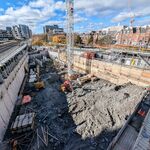Glen
The issue here is indeed dogmatism and ideology colouring one's views.
I don't know AoD on a personal level, but I have not seen in his posts a blantent endorsement of one party or politician, nor an un-abashed assailment of one either.
Whereas, you clearly do have a political axe to grind.
The issue is not the divinity of David Miller, or of the political centre or left.
Nor is it the same in respect of the divinity or hellishness of MR.Miller's opponents, or the political right.
The fact is that poverty, and homelessness are widespread throughout Canada, and Ontario (and much of the world) under regimes of varying ideology.
Anyone will admit, including those of the more conservative persuasion, that the most socialist regime tends to reduce absolute poverty, though, equally it tends to lower the living standard of the middle class, at least at the margins.
But there are conservative minded jurisidictions with lower poverty, and socialistic minded ones with more, and vice versa.
In respect of Mr. Miller there is no single policy you could point to, I feel certain, that has had a material impact on the rate of poverty inside the 416.
That doesn't mean he's perfect, nor does it mean someone else might not do better. But it does mean there is no rational grounds to suggest that a disparity between the 416 and 905 should be layed at his feet.
****
While all the reasons for any disparity can never be known, given that this is a complex and multi-faceted issue......
One can draw some obvious conclusions.
1) Housing costs are much higher in the 416 than in the 905. They have also risen faster in the 416 than the 905. (seen any $8,000,000 condos out there lately?)
Because poverty is measured in Canada based on the percentage of income one spends on food and housing it can be reasonably assumed, all other things being equal, that those in more expensive to live places will experience greater nominal poverty.
2) Why do poor people locate where they do? Its an entirely reasonable and relatively easy to answer question.
If you have little or no money, a minimum wage or no job at all, where would you want to locate?
Probably a place with higher levels of social services. Toronto (416) provides some low-income dental care, it provides vastly more shelter beds, proportionately more social housing, and more subsidized child care than the 905.
The statitics are all public and varifiable.
So, one might imagine, that living in say, Richmond Hill, if you need a bed that night, or child care for a young child, you might relocate south to where you have a much better chance of getting those services.
**
Also of note, is that low-income people are vastly less likely to own a car.
Ergo, the level of transit service available is a critical decision making factor in choosing where to live.
For all the gripes about the TTC ( many of them quite right, I might add), its service is, at its worst, an order of magnitude better than that of 905.
3) Consider the language barrier.
To be sure, many people of various backgrounds and ethnicities choose to live in the 905, as often, or more often than in the 416.
But, many refugees lack familial ties, lack access to a car, and are more likely to find an enclave in the older city which speaks exclusively or predmominently their own tongue.
4) Jobs
Yes lets go there again. Because the unemployment rate is not materially higher in 416 than 905. There is a marginal difference. But it hardly begins to account for the poverty rate differential.
So why is that?
I'm sure you could, and would argue its all about some of the high-paying jobs that have migrated to 905 over the last 20 years (a trend that well predates the current mayor).
Perhaps it has had some impact.
Though given the current mayor has proposed to effectively halve business tax rates by 2017.... I'm not sure it makes sense to lay that at his feet.
He inherited a regime in which Toronto residents pay much lower property tax than their 905 cousins. But Toronto businesses pay more.
This is 1/2 municipal and 1/2 provincial (eduation property tax is provincially determined). There to, it should be said, in the last Provinical budget a committment was made to eliminate that disparity in 416/905 over the next 7 years by then Finance Minister Sorbara.
BUT, since the unemployment rates are not far apart, its difficult to suggest this is the primary cause of any disparity.
Surely, a well-off, well-educated person in Toronto, capable of holding a high-tech job in Markham, can and will commute.
They won't be impoverished because the factory or head office relocated, a few KM north....or west etc.
***
Instead one can attribute the difference this way. A person working at McDonald's in Brampton makes $16,000 per year, so does one in Toronto.
Both pay similar food and utlitity costs.
However, in Brampton a basement apartment might range from $450.00 to $750.00 per month.
The same apartment in Toronto would range from $750.00 to $1,000 per month.
The difference is up to $3,000+ in after tax expenses.
At the same time:
The minimum wage in Toronto is identical to that in Brampton.
The social assitance rate in Toronto is the same as in Brampton
The tax brackets are the same in Toronto and in Brampton.
The costs are the difference.
That is hardly the fault of the current Mayor.
***********
There are many things for which the current mayor and council might be faulted....I'm happy to list them in another thread.
Just don't lay something that has little or nothing to do with the Mayor at his feet.
And don't do a dis-service to an important issue by shrugging off the details in favour of a neat idea that fits with a pre-determined ideological bias.
And which serves no one, least of all the poor, well.




